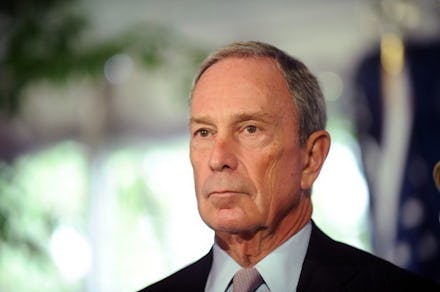12 Things Michael Bloomberg Accomplished As Mayor — For Better Or Worse

Wednesday marked the end of an era in New York: the first day in 12 years without Michael Bloomberg as mayor of the city. During his tenure in office, Bloomberg successfully and indelibly left his mark on the city, for better or worse, championing public health, education, and economic disparity reform. With high ambitions and unprecedented levels of authority, Bloomberg was a high-profile mayor who ultimately leaves a mixed legacy. Here’s a look back at the Bloomberg era, for better or worse.
1. 2002: Tax Hikes
Michael Bloomberg takes office on January 1, succeeding Rudi Giuliani to become the 108th mayor of New York City. During his first year in office, faced with large budget deficits, Bloomberg enacts a series of controversial tax increases which stand in contrast to the tax reductions enacted by his predecessor.
2. 2003: Smoking Ban
March 30 marked the start of a citywide ban on smoking in in public areas such as bars and restaurants, and the beginning of Mayor Bloomberg’s decade-long crusade to rid New York City of its smoking habit.
3. 2004: Crackdown on homelessness
On June 23, Mayor Bloomberg announced a five-year initiative to reduce homelessness in New York City. At the end of the five year period, the plan failed to produce results, and in fact the number of homeless people in shelters and the number of homeless families have increased by 61% and 73% respectively during Mayor Bloomberg’s tenure in office.
4. 2005: Re-election #1
Bloomberg won his first re-election over former Bronx Borough President Fernando Ferrer with widespread support, receiving 59% of the vote in a landslide victory. The mayoral campaign proved fairly one-sided with Ferrer struggling to raise adequate funding, while Bloomberg contributed over $70 million of his own money to ensure his victory.
5. 2006: Trans fat ban
After an unsuccessful campaign to encourage their voluntary use of non-partially hydrogenated oils, New York City banned the use of trans fats by restaurants and eateries on December 5. This was the first instance of a large American city banning trans fats, and helped to kick off efforts across the nation to eliminate their use.
6. 2007: Hybrid yellow cabs
Mayor Bloomberg announced an initiative to update New York’s fleet of yellow cabs to hybrid vehicles by 2012 in a bid to reduce the city’s carbon emissions. The move drew criticism by some for its failure to address the lack of handicap access to taxis, and to this day, the fleet of over 13,000 vehicles has less than 300 with handicap access.
7. 2008: Fast food labeling
Under Mayor Bloomberg, New York became the first city in the country to require restaurants to prominently display the caloric content of their food products in menus and labels. The move exposed the alarmingly high calorie count of many foods offered by chain restaurants and eateries, and was aimed at reducing obesity and its related illnesses.
8. 2009: Re-election #2
After overturning the law which limited him to only two terms in office, Bloomberg won a controversial second re-election by a slim margin against former New York City Comptroller Bill Thompson. Although Bloomberg poured over $90 million of his own money into his campaign, his victory by 51% to Thompson’s 46% exposed his loss of luster and the city’s lack of confidence in their mayor.
9. 2010: Ground zero mosque and a snowstorm
In response to major backlash against the announced plans for Park51, a Muslim community center to be built near the site of the World Trade Center, Mayor Bloomberg offered his support in an impassioned speech.
December 2010 saw Mayor Bloomberg criticized for his inadequate response to the record snowstorm which essentially shut down the city for three days, especially in comparison to the efforts of Newark’s Mayor at the time, Cory Booker (who personally shoveled snow for residents of his city).
10. 2011: Occupy Wall Street
September 17 marked the start of what became a nationwide and eventually global protest movement, Occupy Wall Street. Fed up with the economic stagnation plaguing the country in the wake of the financial meltdown of 2008, protesters gathered in New York's Zuccotti Park to express their ire and spur a change to the unequal distribution of wealth and political influence in the U.S.
The movement based in Zuccotti Park was eventually disbanded, according to Mayor Bloomberg, because the "health and safety conditions became intolerable."
11. 2012: Attempted soft drink ban
On September 13, the New York City Board of Health voted to ban the sale of sugary drinks larger than 16 ounces in restaurants, sports venues, theatres, and food vendors. The ban was proposed by Mayor Bloomberg in May of the same year, and notably didn't apply to certain retailers (such as convenience stores) or include potentially sugar and calorie laden drinks such as fruit juices, or coffee and milk based drinks with over a certain percentage of dairy. Ultimately, the ban was struck down shortly before it was to take effect, largely because of its lack of clarity and many loopholes.
12. 2013: Decrease in crime
Bloomberg's final year in office culminated with a record low occurrence of murders in New York City, standing at 333 as of December 29. This represented a 20% decrease from 2012's figure, and continued the general downward trend of crime in the city over Bloomberg's tenure as mayor. While Bloomberg has touted the positive figures as a highlight of his time in office, there has been much controversy surrounding policies such as stop-and-frisk, used to achieve those figures.